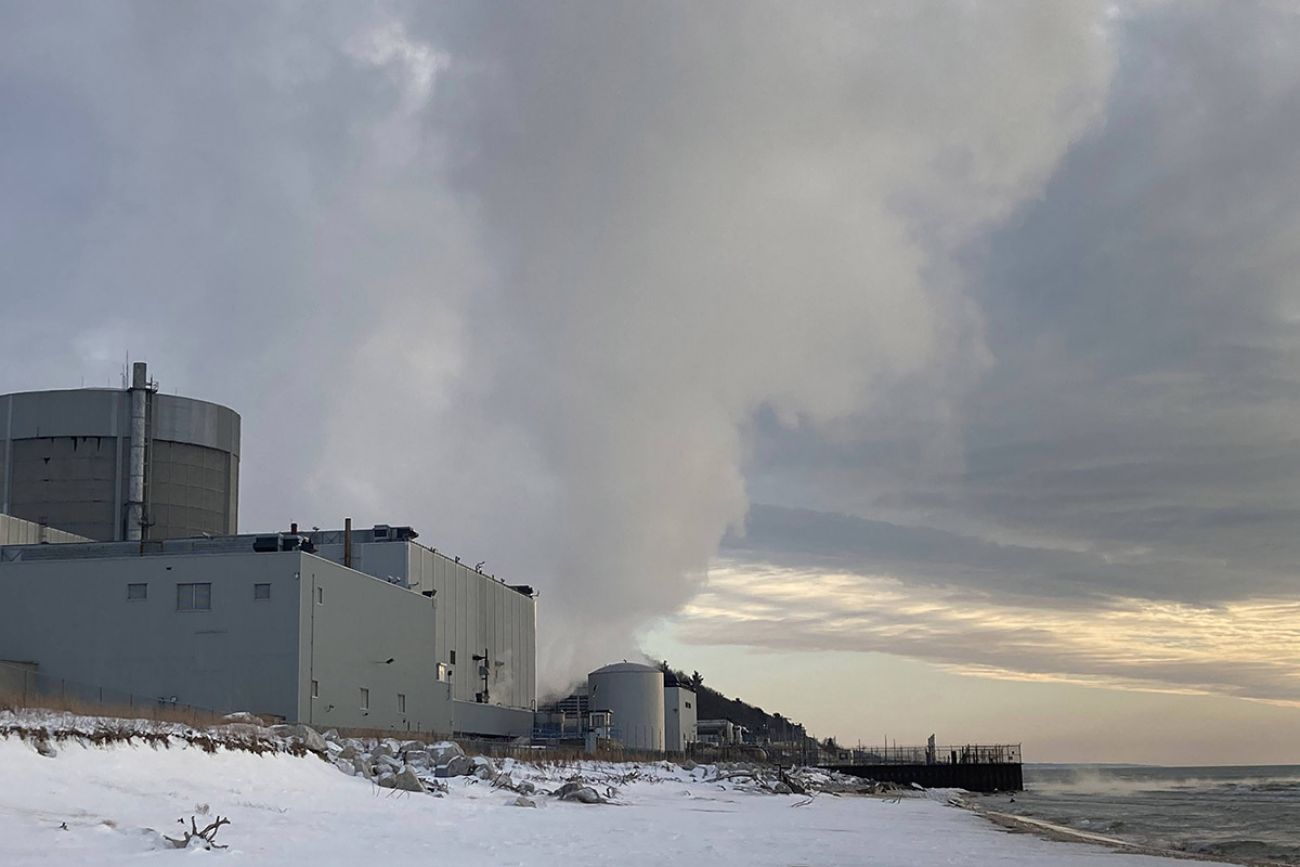Weeks before closure, Whitmer aims to save Michigan Palisades nuclear plant

June 3: Nuclear power is having a moment in Michigan after Palisades
May 20: Owner says Palisades nuclear plant closed for good. Michigan has other ideas
With weeks to go before the planned closure of Michigan’s Palisades nuclear power plant, Gov. Gretchen Whitmer is making a last-ditch effort to keep it open in the name of jobs and clean energy.
Whitmer on Wednesday alerted U.S. Energy Secretary and former Michigan governor Jennifer Granholm that Michigan wants a cut of $6 billion in nuclear credits the Biden administration announced a day earlier to bail out financially-distressed nuclear plants whose closure complicates the country’s pathway to carbon neutrality.
Palisades has a license to operate until 2031, but its owner, Entergy Nuclear, plans to shut it down at the end of May, then sell to Holtec Decommissioning International, a company that would dismantle the plant and stow away its radioactive waste.
Keeping Palisades open, Whitmer said, would protect 600 jobs while preserving the Covert Township plant’s 800-megawatt generating capacity, sparing Michigan from the need to look elsewhere for enough electricity to power hundreds of thousands of homes.
The replacement for all that emissions-free power would likely come at least in part from fossil fuels, setting Whitmer back in her quest to make Michigan carbon-neutral by 2050.
In a statement Wednesday, Whitmer called Palisades’ continued operation “a top priority” to protect jobs, prevent energy price spikes, make Michigan economically competitive and meet the state’s climate goals. She urged companies involved in the plant to “think creatively and optimistically about how to leverage this opportunity.”
Whitmer said the state has had “numerous conversations” with government officials and companies about using the credit program to keep Palisades open. To get a cut of the money, Palisades’ owner or operator would need to apply for funding by May 19.
But at least for now, Entergy officials say they’re sticking with plans for a “safe and orderly shutdown” next month. It’s the last step in the company’s broader strategy to exit the merchant power business as nuclear struggles to be cost-competitive against other forms of energy.
A company spokesperson noted that Entergy is open to selling the plant to other companies, but “no formal proposal to acquire Palisades has been made that provides an opportunity for continued operations and that eliminates the substantial financial and operational risks associated with unwinding the existing contract with Holtec.”
Whitmer’s announcement Wednesday is the latest turn in years of state efforts to prolong the plant’s life. Entergy had originally planned to close Palisades in 2018, but pushed the date back to 2022 after the Michigan Public Service Commission (MPSC) denied a proposed buyout that was crucial to the planned closure.
Reversing the May closure plan would be complicated: More than 130 of the plant’s employees are preparing to transfer to other jobs at Entergy when the plant closes, and others are planning to retire.
Meanwhile, Entergy has been spending down its nuclear fuel in anticipation of a closure, leaving none on-hand to operate the plant beyond May.
But MPSC Commissioner Katherine Peretick said those are surmountable challenges. Peretick said the Biden admin “moved mountains” to launch the credit program before a wave of imminent nuclear plant closures, anticipating that the newly available funds would generate interest from potential buyers.
If a viable buyer emerges for Palisades, she said, the plant would almost certainly sit idle for a period of time amid fuel shortages and other challenges, but federal credits could help keep staff on payrolls during that production lapse.
Peretick said Michigan energy regulators, who have a vested interest in making sure Michigan has enough energy flowing in its grid, “see value in this clean capacity for the needs of our state.”
The need for a bailout stems from nuclear’s difficulty remaining cost-competitive against fossil fuel energy sources that are less expensive to deliver but come with big externalized environmental costs.
Climatologists have warned the world must swiftly move away from fossil fuel energy sources such as coal and gas, or risk worsening floods, fires, droughts and other consequences as the globe warms.
Staffing costs are a major factor in nuclear’s financial problems.
“They end up paying a lot of people’s salaries to keep the plant running,” Peretick said. That’s great for local economies, but bad for companies' ability to compete against, say, gas or coal-burning plants that require fewer workers.
Palisades is one of three nuclear plants in Michigan, the others being American Electric Power’s Donald C. Cook plant in Berrien County and DTE’s Fermi 2 plant in Monroe County. All told, Michigan gets nearly a third of its electricity from nuclear power.
Consumers Energy, which purchases power from Palisades, has vowed to go carbon-neutral by 2040 by building out thousands of megawatts of solar, encouraging energy efficiency and taking other steps.
But for now, Consumers plans to use “a number of sources” to offset the plant’s generating capacity, which amounts to about 10 percent of peak demand, said company spokesperson Josh Paciorek.
Paciorek said the company has no interest in purchasing Palisades. “But if the power from the plant could provide competitively priced and reliable energy for our customers, we would consider working with our partners to keep the plant open.”
The new effort to save Palisades comes amid a pivotal week in Michigan’s climate change world: Michigan Attorney General Dana Nessel on Wednesday announced a proposed settlement with Consumers Energy to stop burning coal for electricity by 2025 – 15 years earlier than the company had originally planned. And on Thursday, state environmental regulators are expected to release their final plan laying out how Michigan can make good on Whitmer’s vow to make the state carbon-neutral by 2050.
Environmentalists have warned that without Consumers’ more aggressive deadline on coal, Whitmer would have little hope of achieving her 2025 goal of reducing greenhouse gas emissions at least 26 percent below 2005 levels. The Michigan Public Service Commission must approve the settlement for it to take effect.
Nuclear power is a more divisive topic among climate activists, with some embracing it as an emission-free energy source that’s crucial to combating climate change, while others point to disasters such as the 2011 meltdown at the Fukushima Daiichi Nuclear Power Plant in Japan as evidence of nuclear’s risks.
Those debates have taken center stage in public listening sessions about Michigan’s draft climate action plan, where pro-nuclear advocates have shown up in force to voice their concerns about closing Palisades.
Charlotte Jameson, chief policy officer for the Michigan Environmental Council, said the group has concerns about building new nuclear plants, but it supports keeping Palisades online. Doing so, she said, buys time to build out Michigan's solar and wind capacity.
By keeping Palisades open and fulfilling the draft climate plan’s call for utilities to get half of their energy from renewables 2030, Jameson said, “all the sudden we’re at 70 perent carbon-free generation by 2030, which would be huge.”
Patrick O’Brien, a spokesperson for Holtec Decommissioning International, the company that plans to purchase and decommission Palisades, said company officials are aware of Whitmer’s bid to keep Palisades open.
“We remain ready, should these efforts to keep the plant operational not be successful, to transition ownership to Holtec after the plant ceases operations for a safe, efficient decommissioning process,” O’Brien said.
Michigan Environment Watch
Michigan Environment Watch examines how public policy, industry, and other factors interact with the state’s trove of natural resources.
- See full coverage
- Subscribe
- Share tips and questions with Bridge environment reporter Kelly House
Michigan Environment Watch is made possible by generous financial support from:
Our generous Environment Watch underwriters encourage Bridge Michigan readers to also support civic journalism by becoming Bridge members. Please consider joining today.
See what new members are saying about why they donated to Bridge Michigan:
- “In order for this information to be accurate and unbiased it must be underwritten by its readers, not by special interests.” - Larry S.
- “Not many other media sources report on the topics Bridge does.” - Susan B.
- “Your journalism is outstanding and rare these days.” - Mark S.
If you want to ensure the future of nonpartisan, nonprofit Michigan journalism, please become a member today. You, too, will be asked why you donated and maybe we'll feature your quote next time!






